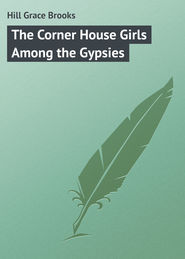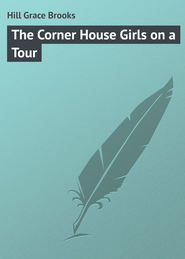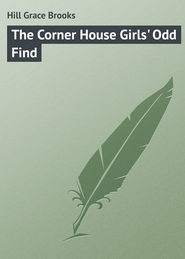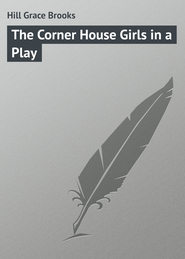По всем вопросам обращайтесь на: info@litportal.ru
(©) 2003-2024.
✖
The Corner House Girls Growing Up
Автор
Год написания книги
2017
Настройки чтения
Размер шрифта
Высота строк
Поля
"I do abominate these folks whose handwriting is so fine that I have to run to get my glasses to know whether it's an invitation to tea or to tell me some bad news," the housekeeper declared, in discussing Dot's improved writing.
The little girl was passing around a paper on which she had copied a sentence that her teacher had written on the blackboard just before closing hour that day. With an idea of testing the children's knowledge of English, the teacher had written the line and told her class to think it over and, in the morning, bring her the sentence rewritten in different words, but retaining the original meaning.
It was the old proverb: "A wink is as good as a nod to a blind horse."
"Of course, I know what it means," Dot said. "If a horse is blind he wouldn't see you nodding or winking. And winking isn't polite, anyway – Ruth says it isn't."
"Correct, Dottums," Agnes agreed. "It is very bad and bold to wink – especially at the boys."
"Wouldn't it be impolite to wink at a horse, too, Aggie?" asked the puzzled Dot. "Don't you think Scalawag would feel he was insulted if I wunk at him?"
"Oh, my eye!" gasped Neale, who chanced to be at hand. "Wink, wank, wunk. Great declension, kid."
"Don't call me 'kid'!" cried Dot. "I am sure that is not polite, Neale O 'Neil."
"Discovered, Neale!" chuckled Agnes.
"You are right, Dottie," said the boy, with a twinkle in his eye. "And to repay you for my slip in manners, I will aid you in transposing that sentence so that your teacher will scarcely recognize it."
And he did so. It greatly delighted Dot, for she did so love polysyllables. The other members of the family were convulsed when they read Neale's effort. The little girl carried the paper to school the next day and the amazed teacher read the following paraphrase of "A wink is as good as a nod to a blind horse:"
"A spasmodic movement of the eye is as adequate as a slight motion of the cranium to an equine quadruped devoid of its visionary capacities."
"Goodness!" Tess declared when she had heard this read over several times. "I don't think you would better read that to Scalawag, Dot. It would make any horse mad."
"Scalawag isn't a horse," responded her sister. "He's a pony. And Neale says he'll never grow up to be a horse. He's just always going to be our cute, cunning little Scalawag!"
"But suppose," sighed Tess, thoughtfully, "that he ever acts like that brown pony of Mrs. Heard's. Jonas, you know."
"Oh, Jonas! He is a bad pony. He gets stuck and won't go," Dot said. "Our Scalawag wouldn't do that."
"He balks, Dot – balks," reproved Tess. "He doesn't get stuck."
"I don't care. You can't push him, and you can't pull him. He just stands."
"Until our Neale whispers something in his ear," suggested Tess.
"Oh, my!" exclaimed her little sister. "Suppose Scalawag should be taken that way. What would we do? We don't know what Neale whispered to Mrs. Heard's pony."
"That's so," agreed Tess. "And Neale won't tell me. I've asked him, and asked him! He was never so mean about anything before."
But Neale, with a reassuring smile, told the little girls that Scalawag would never need to be whispered to. In fact, whispering to the calico pony would merely be a waste of time.
"There's nothing the matter with the old villain but inborn laziness," the youth chuckled. "You have to shout to Scalawag, not whisper to him."
"Oh!" murmured Tess, "don't call him a villain. He is so pretty."
"And cute," added Dot.
Uncle Rufus had built him a nice box stall and Neale took time early each morning to brush and curry the pony until his coat shone and his mane was "crinkly."
Before the week was out, too, the basket phaeton arrived and a very pretty russet, nickel-trimmed harness. Even the circus trimmings had never fitted Scalawag better than this new harness, and he tossed his head and pawed, as he had been trained to do, arching his neck and looking just as though he were anxious to work.
"But it's all in his looks," observed Neale. "He doesn't mean it."
Which seemed to be the truth when the two little girls and Sammy Pinkney got into the phaeton with Neale and took their first drive about the more quiet residential streets of Milton.
Scalawag jogged along under compulsion; but to tell the truth he acted just as though, if he had his own choice, he would never get out of a walk.
"Je-ru-sa-lem!" muttered Sammy. "It's lucky we don't want to go anywhere in a hurry."
It was great fun to drive around the Parade Ground and see the other children stare. When Sammy was allowed to hold the lines he sat up like a real coachman and was actually too proud for speech.
The responsibilities of his position immediately impressed the embryo pirate. Neale taught him carefully how to drive, and what to do in any emergency that might arise. Scalawag was an easy-bitted pony and minded the rein perfectly. The only danger was the pony's slowness in getting into action.
"I reckon," declared Neale, with some disgust, "if there was a bomb dropped behind him, old Scalawag wouldn't get out of the way quick enough, even if there was a five-minute time fuse on the bomb."
"Well, I guess he'll never run away then," said Tess, with a sigh of satisfaction. Nothing could be said about Scalawag that one or the other of the two little girls could not find an excuse for, or even that the criticism was actually praise.
"One thing you want to remember, children," Neale said one day, earnestly. "If you're ever out with Scalawag without me, and you hear a band playing, or anything that sounds like a band, you turn him around and beat it the other way."
"All right," responded the little girls.
"What for?" asked Sammy, at once interested.
"Never mind what for. You promise to do as I say, or it's all off. You'll get no chance to drive the girls alone."
"Sure, I'll do what you say, Neale. Only I wondered what for. Don't he like band music?"
But Neale, considering it safer to say nothing more, merely repeated his warning.
The children drove out every pleasant afternoon when school was over, and within the fortnight Sammy and Tess and Dot were going about Milton with the pony through the shady and quiet streets, as though they had always done so. Therefore the older Corner House girls and Neale could take their friends to drive in the motor-car, without crowding in the two smaller children.
The "newness" of the automobile having worn off for Tess and Dot, they much preferred the basket carriage and the fat pony. They, too, could take their little friends driving, and this added a feeling of importance to their pleasure in the pony.
Had Tess had her way every sick or crippled child in town would have ridden behind the calico pony. She wanted at once to go to the Women's and Children's Hospital, where their very dear friend, Mrs. Eland, had been matron and for the benefit of which The Carnation Countess had been given by the school children of Milton, and take every unfortunate child, one after another, out in the basket carriage.
Their schoolmates especially had to be invited to ride, and Sadie Goronofsky from Meadow Street, and Alfredia Blossom, Uncle Rufus' granddaughter, were not neglected.
"I do declare!" said Aunt Sarah, with some exasperation, as she saw the pony and cart, with its nondescript crew, start off one afternoon for a jog around the Parade Ground. "I do declare! What riffraff Tess manages to pick up. For she certainly must be the biggest influence in gathering every rag, tag and bobtail child in the neighborhood. I never did see such a youngster."
"It isn't that Tessie's tastes are so heterodox," Ruth said, smiling quietly, "but her love for others is so broad."
"Humph!" snapped Aunt Sarah. "It's a wonder to me the child hasn't brought smallpox into the family from going as she does to those awful tenements on Meadow Street."
Aunt Sarah had always been snobbish in her tendencies, even in her days of poverty; and since she enjoyed the comforts and luxuries of the old Corner House it must be confessed that this unpleasant trait in the old woman's character had been considerably developed.
"The only tenements she goes to on Meadow Street are our own," Ruth replied with vigor. "If they are conducted so badly that diseases become epidemic there, we shall be to blame – shall we not?"










